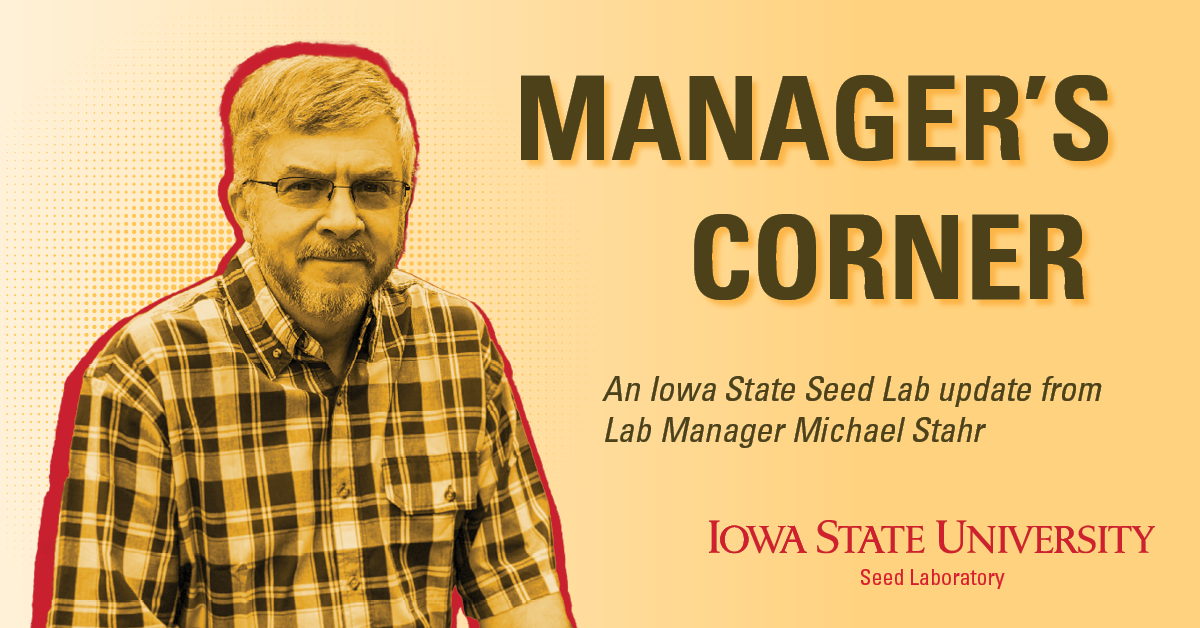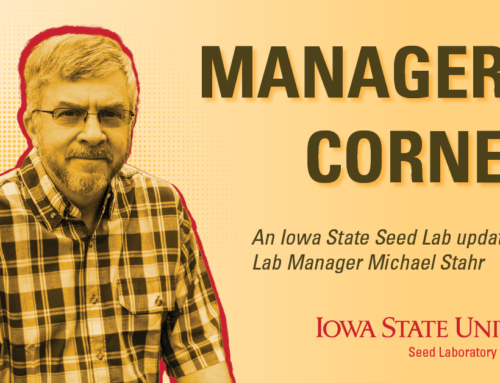Currently, using cover crops and putting land into conservation reserve (specifically through the new Pollinator Program) is very popular. However, The Natural Resources Conservation Services (NRCS) requires that seed used as a cover crop (typically rye or oat seeds) be sent to a seed lab for a warm (standard) germination test and a purity test. The Pure Live Seed (PLS) percentage will be calculated and noxious weeds will be checked for. Seed lots being tested will not be certified—as occurs in a crop improvement lab that certifies seeds as to variety, but rather the lab tests them to ensure to NRCS that producers are using quality seeds for cover crops. If seeds are to be sold to other producers, a mechanical purity test, noxious weed exam, and a germination test must be conducted. If primary noxious weed seeds are present in a sample, then the seed lot cannot be sold until the noxious weeds are removed through seed conditioning
If you have a cover crop seed lot that needs to be tested, feel free to send them to the Iowa State University Seed Lab for evaluation. For information on how to submit a sample to the ISU Seed Lab, visit the “Services” page of the Seed Lab website and select “Submitting Samples, Forms, E-Transfer (https://www.seedlab.iastate.edu/submitting-samples-forms-e-transfer).” Alternatively, you can call our customer service representative Cherie Hill at 515-295-6826 or e-mail seedlab@iastate.edu.
For more information about requirements for farmers wishing to sell seed, read the Iowa Department of Agriculture and Land Stewardship’s (IDALS) “Selling Agricultural Seed in Iowa” Including Selling Direct From the Farm Permit & Labeling Requirements document, or contact (Robin.Pruisner@Iowaagriculture.gov).
Seed Testing is a Year-Round Occurrence at ISU Seed Lab
Although Iowans and individuals from other states tend to think of fall as the end of the growing season, in reality seed testing is a year-round occurrence. In mid-summer oats are harvested, and testing them requires that a pre-chill be conducted to force the seeds out of their dormancy. Mother Nature wisely prevents many types of seeds from sprouting until after they experience cold temperatures followed by extended periods of warmer temperatures. Seed corn is typically harvested in September, and soybeans in September or October. However, because the ISU Seed Lab receives several hundred species of seeds from across the U.S. and around the world, seed testing in the ISU Seed Lab happens year round. In fact, we continually conduct more than 50 types of tests on flowers, vegetables, grasses, forages, and other species. The tests range from tests for mechanical purity, to germination & vigor, to phytosanitary evaluations, to tests that verify desired and undesired presence of biotech traits.
Putting Our Customers First
Even though the Iowa State University Seed Lab is one of the largest public seed labs in the world, our focus is on treating seed companies, researchers, farmers, and others as cordially as if we are neighbors talking across the back fence. We offer tests that are essential to the industry—tests that may not be offered elsewhere—while making it a priority that your results are accurate and received in a timely manner.
At the ISU Seed Lab we love what we do. That is reflected by our customers, who continually rate our services as among the best in the industry. As a seed analyst with more than 37 years of experience in seed testing, I look forward to learning something new each day. And, I am proud to say that at the ISU Seed Lab, we carry that enthusiasm forward into serving in leadership positions for such organizations as the AOSA, SCST, and ISTA.
ASTA’s motto for many years has been “First the Seed.” At the ISU Seed Lab you’ll find that we are passionate about seeds—and as always, we will continue to put you, our customer, first.
Mike


